Opposition failed to gauge Modi tsunami
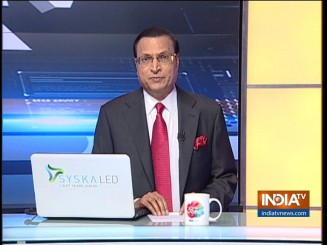 Normally people know days in advance whenever a severe cyclone takes place. But in the case of a tsunami, it is the opposite. A tsunami takes place when there is a high intensity earthquake on the deep ocean floor, and the water level on the sea shores rises gradually, which suddenly takes the shape of a huge tsunami that washes away everything in its wake, even before people can react and run to safety.
Normally people know days in advance whenever a severe cyclone takes place. But in the case of a tsunami, it is the opposite. A tsunami takes place when there is a high intensity earthquake on the deep ocean floor, and the water level on the sea shores rises gradually, which suddenly takes the shape of a huge tsunami that washes away everything in its wake, even before people can react and run to safety.
The Lok Sabha election, unlike the 2014 one, had the markings of a tsunami. There was a strong undercurrent among voters in favour of Modi, spread from Himachal Pradesh, Haryana, Uttarakhand, Rajasthan, MP and Delhi in the north to Bihar, West Bengal, Assam and Odisha in the east, and right up to Maharashtra, Gujarat and Karnataka in the West and South.
The entire election campaign this time centered around Modi – his image and his performance. Modi was ruling the hearts of millions of voters. His landmark schemes like toilets, LPG cylinders and houses for the poor, loan for the lower middle class traders, had a tremendous effect. Even if we assume that 12 crore lower middle class and poor families got the synchronic benefits of all these schemes put together, it amounted to a huge voter base for Modi.
Added to this were the first time voters, who normally keep their connect with the outside world mostly through internet. A tech savvy PM like Modi knew the effect of PUBG and Avengers on these teenage voters, and he mentioned this too in his speeches.
Also, senior opposition leaders like Rahul Gandhi, Akhilesh Yadav, Tejashwi Yadav and Mamata Banerjee hurling abuses at Modi had a big negative effect. The voters remained silent and taught these leaders a lesson for making fun of Modi building toilets and describing him as “Chowkidar Chor Hai”.
Opposition leaders failed to gauge the mind of Prime Minister Modi, just as Pakistan army failed to anticipate an air strike. Modi told me in his interview, how Pakistan army had amassed tanks and missiles on the border anticipating a surgical strike on land, and how our air force pilots crossed over from air “in the name of Bajrangbali” and strafed the terrorist hideout in Balakot, deep inside Pakistan. Similarly, opposition leaders too failed to read Modi’s engimatic mind and could not gauge which direction he would take during the poll campaign.
Leaders like Akhilesh Yadav and Mayawati buried their 25-year-old enmity and joined hands to give Modi a fight. Similarly, Congress and JD(S) joined hands in Karnataka, and were deeply ensconced in the belief that mere alliance will give them the desired gains. It was Amit Shah who told me in an interview that eight crore poor people in UP got the benefits of Modi’s welfare schemes, and this amounted to a hike of seven per cent in voting percentage terms in favour of BJP. In Karnataka, the Congress and JD(S) were practically washed away, and they had to be content with only two seats.
Click Here to Watch Full Video| Get connected on Twitter, Instagram & Facebook
A big salute to the Indian voter and Narendra Modi
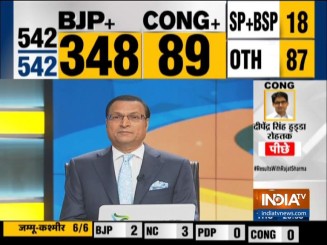 India on Thursday gave a resounding mandate to Prime Minister Narendra Modi and his Bharatiya Janata Party for another second term in power, cutting across deep fault lines of caste, religion, family loyalties and class drawn over several decades. The BJP won 303 LS seats and the BJP-led National Democratic Alliance won 352 seats in the Lok Sabha.
India on Thursday gave a resounding mandate to Prime Minister Narendra Modi and his Bharatiya Janata Party for another second term in power, cutting across deep fault lines of caste, religion, family loyalties and class drawn over several decades. The BJP won 303 LS seats and the BJP-led National Democratic Alliance won 352 seats in the Lok Sabha.
The main opposition party Congress faced a humiliating defeat and it could barely manage to hike up its 2014 tally of 44 to 52 seats this time. Congress President Rahul Gandhi was defeated by Union Minister Smriti Irani in his family borough of Amethi in Uttar Pradesh. His win from Wayanad in Kerala was the only saving grace.
The Samajwadi Party and Bahujan Samaj Party who forged an alliance in UP were defeated, while the Rashtriya Janata Dal-led ‘Maha Gathbandhan’ was crushed by BJP-JD(U)-LJP alliance in Bihar.
It was indeed a historic day in India’s post-Independence history. Prime Minister Narendra Modi naturally deserves congratulations for this hard-earned victory, but I want to congratulate and thank the people of India for this landslide win. The Indian voters showed they were mature enough in electing a strong and stable government led by a decisive leader. In the process, they have strengthened India’s democracy and have paved the way for India’s likely emergence as a world superpower.
I salute the people of India for rejecting the crass politics of caste and religion, for openly showing unhappiness over dynastic politics that has been perpetuated over the decades since independence. The people voted as one and kept the interests of India in their mind.
I congratulate Modi for his boundless energy, his utmost dedication, his clean image and his sincerity in winning the hearts of the common people. It was he who guided the voters to keep nationalism above dynasty, caste and religion based politics.
Normally, members of Parliament elect their leader as Prime Minister, but it was in reverse order this time. It was the PM who single handedly got his candidates elected as MPs. The message is clear: the people of India voted Modi to power for his government’s performance over the last five years. For the first time in post-Independence history, a non-Congress government has been re-elected for another term at the Centre. After Jawaharlal Nehru and Indira Gandhi, Modi became the third leader to win a successive mandate. To be brief: the victory this time was purely Modi’s.
On Thursday, Modi was at his best when he showed humility while accepting the accolades of thousands of his party workers at the party office. The people of India trust Modi for delivering on his promises. In an earlier episode of my show ‘Aap Ki Adalat’ several years ago, Modi had said that the Indian government should stop writing ‘love letters’ to Pakistan. He put his own advice into action, when he ordered a surgical strike after Uri terror attack, and then directed an air strike deep inside Pakistan to punish the perpetrators of crime in Kashmir’s Pulwama.
The people of India wholeheartedly praised Modi’s actions against Pakistan. This was the new face of a changing India. The people supported his “ghar mein ghus ke marengey” (we will strike inside their home) assertions with full throated vigour. They gave him more than 300 LS seats, so that he can head a strong government that can give a stern message to the wrongdoers.
The debacle of India’s Grand Old Party was all the more saddening. The Congress lost because of its president Rahul Gandhi’s exceeding overconfidence, his use of slur words like “Chowkidar Chor Hai’ against the Prime Minister, his baseless allegations of “Modi put Rs 30,000 crores in Anil Ambani’s pockets” at almost all his rallies, his threat of throwing Modi behind bars if Congress came to power, his dragging of names of Modi’s parents in the heat of poll campaign. The common voter disliked this and then decided to give the party and its leader a tight slap. Rahul was defeated in his family borough of Amethi. The last defeat of his family in Amethi was in 1977, when Sanjay Gandhi was defeated after Emergency.
Several senior Congress leaders I had spoken to, had told me that the common voters were not taking Rahul’s words on unemployment, farm distress and Rs 72,000 per annum NYAY promise, at face value. His rantings on Rafale deal did not cut any ice among the electorate.
The result: Had the Congress not won 18 LS seats from Kerala, the party’s overall tally in Parliament would have gone much below 44 that it had won five years ago. Rahul has faced a major political defeat. I believe that he could have avoided delaying the entry of his sister Priyanka Vadra into politics. He practically wasted the campaigning power and stamina of his sister in this election.
The surprising results from Bihar and Uttar Pradesh signify the emergence of a new brand of politics in these two caste conscious states.
On Wednesday, a day before counting, I had a word with all our camera persons and reporters, who traversed the length and breadth of UP and Bihar to bring election news to your homes on television. Most of them told me that the Modi government along with Yogi’s and Nitish Kumar’s state governments, ensured that the fruits of welfare schemes reached the homes of poor and lower income groups. These poor voters benefited immensely from direct benefit transfer, and they cut across caste and religion to vote for Modi.
You may have noticed during the campaign that SP supremo Akhilesh Yadav and RJD leader Tejashwi Yadav used to say that Modi’s speeches begin with toilets and end with toilets. They were poking fun at Modi on the issue of Swachh Bharat. On the other hand, Modi used to describe in his speeches how his government had saved women from the indignity of being forced to defecate in the open, by building toilets in villages. This touched an emotional chord in the hearts of women in these two Hindi heartland states.
Similarly, millions of small traders benefited from Mudra loan yojana, poor women in villages got LPG cylinders in their kitches under Ujjwala yojana, and low income families got houses under Pradhan Mantra Awas Yojana. Clearly Modi had succeded in providing welfare benefits to the poorest of the poor, and the voters cut across caste and religion lines to vote for him. They refused to kowtow to decades old so-called “vote banks” based on caste, clan, dynastic and religious loyalties. They were now voting for performance at the ground level.
In West Bengal, the common voters gave a warning signal to Trinamool Congress chief Mamata Banerjee by electing 18 BJP MPs, and limiting the TMC to 22 seats. How did this miracle happen? Eight years ago, Mamata’s party had wrested power from the Left Front after years of struggle
, but in the process, her party adopted the same formula used by the Left, that led to its downfall. BJP workers this time fought political battles against Mamata over issues of appeasement of minorities and restrictions on Durga idol immersion. Several of their party workers laid their lives because of political violence, while the silent majority in Bengal kept watching. The common voters did not come out on the streets to shout slogans. They decided to quietly walk into the polling booths and cast their votes for BJP. Mamata Banerjee has now alleged tampering of electronic voting machines, but none in Bengal is going to buy her theory.
In Punjab, the ruling Congress party managed to win only eight out of total 13 seats. The party could have won more seats, but chief minister Capt. Amarinder Singh blamed this on his minister Navjot Singh Sidhu for allowing himself to be hugged by Pakistan Army Chief General Bajwa. This sent a wrong message to the common voters in Punjab, who decided to teach the Congress a lesson.
To sum up, the voters of India have sent all those leaders packing who had been seeking votes in the name of caste, clan and religion. It is clear that the electorate will now elect its representatives only on the basis of performance and positive thinking. Modi built toilets, and women voted for him. Modi built houses, and the poor voted for him. Modi gave expensive medical treatment facility up to Rs 5 lakh to poor people, and the downtrodden voted for him. If a political party gets votes for providing LPG cylinders and electricity to the poor, there is nothing wrong in it. Modi told the middle class that he was using their money from the taxes they were paying to help the poor, and the middle class trusted him.
Had the Opposition understood Modi’s line of thought, it could have had a chance to give him a sensible fight. The opposition chose the traditional method of ‘vote banks’, ‘vote mathematics’ and ‘family loyalties’, and this was a major blunder. The opposition failed to understand Modi, but the common voter understood Modi, and saluted him by extending his wholehearted support.
Click Here to Watch Full Video| Get connected on Twitter, Instagram & Facebook
Questioning the EVM amounts to insult of democracy
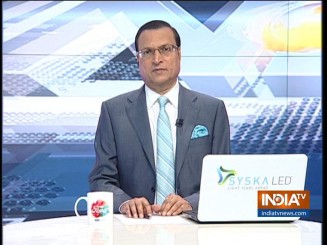 Soon after the exit poll projections hinting at a comfortable victory for Prime Minister Narendra Modi-led National Democratic Alliance were out on news channels on Sunday evening, the social media went on overdrive and several videos were posted on Monday to allege that electronic voting machines were being replaced or manipulated at some counting centres.
Soon after the exit poll projections hinting at a comfortable victory for Prime Minister Narendra Modi-led National Democratic Alliance were out on news channels on Sunday evening, the social media went on overdrive and several videos were posted on Monday to allege that electronic voting machines were being replaced or manipulated at some counting centres.
Nearly 22 opposition parties held an urgent meeting on Tuesday, and marched to Election Commission demanding that if any discrepancy in matching of VVPAT slips with EVM results was found, then 100 per cent matching of VVPAT slips with EVM results must be made. Similarly, a petition was taken up in Supreme Court, filed by a Chennai NGO, demanding 100 per cent counting of VVPAT slips, but the vacation bench of the apex court threw out the request citing an earlier order of the Chief Justice of India.
Coming to the video clips that were in circulation, the Election Commission checked all of them, and came out with a detailed statement saying that almost all of them were old ones, and all those issues have already been dealt with, to the satisfaction of candidates.
Questioning the integrity and impartiality of the Election Commission, without even a shred of solid evidence, and that too, even before the votes are counted, amounts to insulting democracy.
If the 22 opposition parties had solid proof, they should have come forward with details. But levelling allegations of EVM manipulation on the basis of video clips of questionable antecedents, circulated on social media, and that too, unverified ones, is unacceptable. Nobody is going to support such a step which amounts to creating mistrust in the minds of people over the electoral process.
One can understand common people being swayed by such video clips circulating on social media, but it becomes a matter of concern when senior political leaders accept these video clips as true, and that too, without verifying them.
On Monday, four such video clips, all from UP, surfaced which showed verbal exchanges between political party agents and polling officials, and transport of EVMs on trucks. One of these videos was posted by supporters of Samajwadi Party chief Akhilesh Yadav, while in Bihar, videos from Patliputra and Chhapra, were retweeted by RJD leader Tejashwi Yadav, and these were immediately circulated on social media by his sympathizers.
All these video clips were found to be two or three weeks old, and in all cases, according to the EC, the matters were immediately resolved. I would therefore appeal to all right thinking people not to forward such questionable video clips being circulated on social media, without verifying them from credible sources.
As regards tampering of EVMs, one should note that Lok Sabha elections were conducted in 2004 and 2009 through EVMs and the Congress and its allies formed governments at the Centre. Similarly last year, assembly elections were conducted through EVMs in Chhattisgarh, MP and Rajasthan, and the Congress formed state governments. It is clear that those who fear impending electoral defeats start questioning EVMs.
Opposition parties had approached the Supreme Court, and the apex court had directed that VVPAT slips from five EVMs in each assembly segment be matched with the results. Questioning the EVMs despite the Supreme Court ruling and the assurances given by Election Commission, will mean that those why are crying foul have doubts in their minds over their victories, and not over the EVMs.
Click Here to Watch Full Video| Get connected on Twitter, Instagram & Facebook
Why the exit poll projections in favour of Modi sound convincing
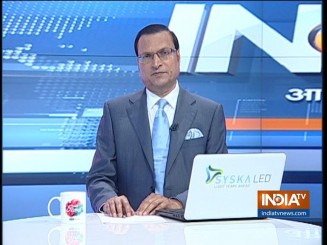 The exit poll projections are out and almost all of them have predicted a clear majority for Prime Minister Narendra Modi-led National Democratic Alliance in the Lok Sabha elections. While BJP leaders have welcomed the projections, Congress leader Priyanka Gandhi has cautioned her party workers not to fall prey to rumours emanating from exit polls and lower their guard at counting centres Trinamool Congress chief Mamata Banerjee said, “I don’t trust exit poll gossip. The game plan is to replace or manipulate thousands of EVMs through gossip.”
The exit poll projections are out and almost all of them have predicted a clear majority for Prime Minister Narendra Modi-led National Democratic Alliance in the Lok Sabha elections. While BJP leaders have welcomed the projections, Congress leader Priyanka Gandhi has cautioned her party workers not to fall prey to rumours emanating from exit polls and lower their guard at counting centres Trinamool Congress chief Mamata Banerjee said, “I don’t trust exit poll gossip. The game plan is to replace or manipulate thousands of EVMs through gossip.”
Nationalist Congress Party chief Sharad Pawar said exit poll predictions are ‘nautanki’ and the truth will be out on May 23. Pawar is an experienced politician, but his comments in the last few weeks have not been commensurate with his political stature. Pawar said that if his daughter Supriya Sule loses from Baramati, then it would mean EVMs have been manipulated. He also remarked that people will come out on the streets if her daughter lost. Surely this was a dangerous remark. Pawar also questioned why the Prime Minister who shoulders the responsibility of the nation spent a whole day meditating in Kedarnath. Pawar made this remark at an iftaar party. He should take note of comments being made on social media that in the earlier regimes, pictures of iftaar party used to be published, but times have changed, and pictures of Char dham yatra are now being shown. An experienced politician like Pawar will surely gauge the changes that are taking place in the minds of public.
Coming to the exit polls: I do not think they are reasons to doubt the veracity of exit poll projections. If you add the sample size of all exit polls, it comes to more than 20 lakh respondents. That brings an average of roughly 3,000 voters expressing their opinion in each LS constituency. This is surely a big sample size, and if all the exit polls predict a majority for Modi, there can be no reason to doubt the projections. Figures may vary, but even if NDA gets 250+ seats, it will be Modi who will be forming the government.
I think, there could be several reasons for this assumption. One, majority of the young voters are connected through social media and internet, and most of them have supported Modi. There is a report in The Hindu daily newspaper, which says that issues like Rafale deal and unemployment did not cut much ice in the minds of young voters. GST, which affected shopkeepers, and was described as Gabbar Singh Tax by Rahul Gandhi, affected only 12 pc of the voters. Rahul Gandhi’s much touted NYAY scheme that promised Rs 72,000 annually to below poverty level families, failed to catch the imagination of the voters.
On the other hand, most of the voters, according to this report, felt that Narendra Modi was not corrupt, and corruption was not an issue in this election at all. The most important reason behind support for BJP was that there was no credible opposition candidate for the post of PM to match the stature of Modi. It was simple TINA – There Is No Alternative. Most of the voters rejected dynastic politics completely.
In short, Modi was the only figure that dominated the Lok Sabha elections – for or against. NDA had a clear PM candidate, whereas the Opposition had too many claimants, and this amused most of the voters. If the exit poll projections are correct, it means the opposition has no capability to digest them. India TV reporters told me that at many places, while the common voters were unhappy with their BJP candidates, they were unequivocal in saying that they would vote for Modi.
The opposition kept its hopes alive for Uttar Pradesh, where the SP-BSP alliance was expected to decimate the BJP, but this has not happened. The figure-crunching pundits were questioning how the BJP would make up for the losses that it may face in UP. They were banking on TMC’s win in West Bengal. But there has been a sea change in the outlook of Bengal voters and Mamata Banerjee is facing the toughest challenge of her political career. There could be major upsets in favour of the BJP both in West Bengal and Odisha.
Rahul cannot blame media for giving more space to Modi
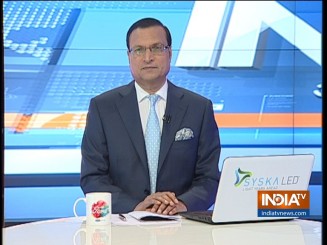 Electioneering for the Lok Sabha elections ended on Friday evening, and the two stalwarts of the Indian political spectrum – Prime Minister Narendra Modi and Congress President Rahul Gandhi – addressed press conference almost simultaneously in Delhi.
Electioneering for the Lok Sabha elections ended on Friday evening, and the two stalwarts of the Indian political spectrum – Prime Minister Narendra Modi and Congress President Rahul Gandhi – addressed press conference almost simultaneously in Delhi.
There is no doubt that Prime Minister Modi exerted his utmost by traversing the length and breadth of India addressing election rallies. BJP, which has been in power at the Centre for the last five years, had been initially on the defensive when the election campaign began, but it goes to the credit of Modi that he single handedly took the fight into the opposition camp and converted this critical challenge into an opportunity.
Modi was at his aggressive best in states like West Bengal, UP, Bihar and Kerala. The entire burden of BJP’s campaign was on Modi’s shoulders, and he made a direct appeal to the voters saying that each vote for BJP would go personally to his account.
On May 19, after the final phase of polling is over, the exit poll results will be out on electronic media. I have the exit poll figures for the first six phases of polling, but Election Commission’s order prohibits telecast of exit poll results before 6.30 pm on May 19.
Both Modi and BJP President Amit Shah have claimed that the party would get a comfortable majority. How far this claim is true, I shall reveal on Sunday evening when the exit poll results will be telecast on India TV.
Congress President Rahul Gandhi on Friday did not say how many seats his party will win, but he took potshots at Modi. Rahul said that Modi avoided speaking on issues like Rafale, unemployment and farm distress, but spoke about how to eat mangoes in his interviews. Rahul also blamed the media for not questioning the PM seriously on these issues.
I have a small correction here to make. The interviewer, Akshay Kumar, who asked Modi how he ate mangoes, was not a journalist. He is a Bollywood actor not connected with media. And Media can’t be held responsible for what he asked.
Earlier this month, I had interviewed Prime Minister Modi in front of several thousand viewers in a packed stadium, and asked him questions on all important issues – his foreign policy, on relations with China, on his sudden visit to Lahore, on Balakot air strike, on Rahul’s allegation that he gave away Rs 30,000 crore to Anil Ambani, on Nirav Modi and Vijay Mallya.
I also allowed viewers to put questions to the PM. The people of India have a clear understanding about issues and personalities. That is why this mega interview with the PM got historic viewership. Crores of Indians watched this interview on India TV. Hence it was improper on part of Rahul Gandhi to say that the media is not impartial.
Many people who watched the interview with Modi asked me why I did not invite Rahul Gandhi for a similar interview.
Today I want to reveal that for the last five years, I have been sending letters and messages to Rahul Gandhi and his advisers, but he was not ready to face my questions. Neither did he refuse, nor did he give consent to attend my show Aap Ki Adalat.
I have no grievance against Rahul. It is his right to decide whose questions he wants to answer, and whom he wants to avoid. But I am revealing this to all my viewers and fans so that Rahul cannot blame the media for giving more space to Modi. What I personally feel is: Rahul seeks his own comfort zone, and then blames the media for being partial.
Had Rahul accepted my invitation and come to my show and summoned the courage to answer questions, the people of India would have listened to him, he would have got a wider platform and his interview too would have been watched by crores of Indians.
Click Here to Watch Full Video| Get connected on Twitter, Instagram & Facebook
How Modi has put Mamata on the defensive in Bengal
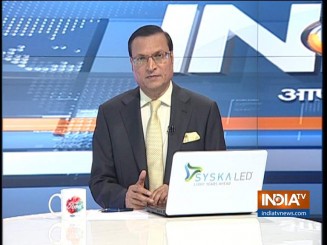 On the last day of electioneering in violence-prone West Bengal, people at her rally were amused to find Chief Minister Mamata Banerjee chanting Durga Stuti shlokas, Allahu Akbar, God is great and Buddham Sharanam Gachhami, only to underscore the point that she is not appeasing Muslims alone. She was, in other words, projecting her so-called secular credentials.
On the last day of electioneering in violence-prone West Bengal, people at her rally were amused to find Chief Minister Mamata Banerjee chanting Durga Stuti shlokas, Allahu Akbar, God is great and Buddham Sharanam Gachhami, only to underscore the point that she is not appeasing Muslims alone. She was, in other words, projecting her so-called secular credentials.
Mamata Banerjee fears that Bengali Hindus may shy away from voting for Trinamool Congress, given the fact that her police had arrested BJP supporters chanting ‘Jai Shri Ram’. Mamata’s government had also put curbs on Durga idols immersion timings because it had clashed with Mohurram processions. Her government had refused permission for Ram Navami processions.
BJP leaders led by Amit Shah and Yogi Adityanath went to town during the election campaign, alleging that Mamata Banerjee was anti-Hindu. Amit Shah even went to the extent of chanting Jai Shri Ram and dared the local police to arrest him. Yogi Adityanath also chanted Jai Shri Ram in all his rallies in Bengal, putting TMC leaders on the backfoot.
BJP leaders, including Prime Minister Narendra Modi, had been raising the issue of illegal Muslim immigrants from neighbouring Bangladesh and have promised to implement the Citizenship Amendment Act which provides for granting citizenship to all Hindu, Sikh, Buddhist and Christian migrants (except Muslims) who have fled from Pakistan, Bangladesh and Afghanistan.
Both the Left Front and Congress are now absent from the political scene in Bengal, and BJP has emerged as the main rival to Trinamool Congress. Mamata has now become jittery as she fears that Bengali Hindus may desert her in large numbers during elections. She has been using words like “goonda”, “jhootha” for Prime Minister Narendra Modi and Amit Shah. She has been raising slogans of ‘Chowkidar Chor Hai’ at her rallies.
I have never seen Mamata Banerjee so aggressive in the last ten years. Before she came to power, she used to chant slogans like “CPM Hatao, Bengal Bachao”. Now her slogan is “Modi Hatao, Bengal Bachao”. It was she who singlehandedly fought the Left Front and dislodged it from power after 34 years of uninterrupted rule.
As Chief Minister, Mamata Banerjee had been abstaining from chanting slogans like an Opposition leader all these years. However, during the current Lok Sabha elections, she has donned the role of a street fighter and an Opposition leader, as she fears that the challenge from Modi is very, very big.
Click Here to Watch Full Video| Get connected on Twitter, Instagram & Facebook
Why is Mamata furious over EC’s curb on campaigning in West Bengal?
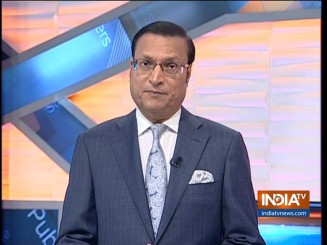 Consequent to the clashes that took place in Kolkata on Tuesday during BJP President Amit Shah’s roadshow, the Election Commission took a strong view and, in order to curb further violence in the run-up to the last phase of polling on Sunday, curtailed campaigning by 24 hours. This means that political parties in West Bengal cannot campaign for 72 hours prior to polling.
Consequent to the clashes that took place in Kolkata on Tuesday during BJP President Amit Shah’s roadshow, the Election Commission took a strong view and, in order to curb further violence in the run-up to the last phase of polling on Sunday, curtailed campaigning by 24 hours. This means that political parties in West Bengal cannot campaign for 72 hours prior to polling.
The Election Commission took this unprecedented step in exercise of its powers under Article 324 of the Constitution. It also ordered the immediate transfer of two of Chief Minister Mamata Banerjee’s closest aides, Rajeev Kumar, ADG, CID and Principal Secretary (Home) Atri Bhattacharya. According to the EC, Rajeev Kumar, as per report of EC observers, was himself arresting people on Tuesday evening. He has been asked to report o the Ministry of Home Affairs by 10 am in Delhi on Thursday.
The Principal Secretary (Home) Atri Bhattacharya was transferred because, according to the EC, he was interfering in the poll process by writing letter to the West Bengal Chief Electoral Officer with directions on how to conduct the polls.
Rajeev Kumar, it may be recalled, is presently under CBI lens in the Saradha chit fund scam. He had used Kolkata Police in February this year to prevent a team of CBI officers who went to question him at his residence. The same night Mamata Banerjee along with her party leaders and Rajeev Kumar sat on a nightlong dharna to protest the CBI action. The matter was resolved after the Supreme Court directed Rajeev Kumar to appear before the CBI in a neutral place like Shillong.
On Wednesday night, we showed in Aaj Ki Baat show, how a furious Mamata Banerjee lashed out at the Election Commission, alleging it has been infiltrated by RSS men, and that the EC decision was illegal and unconstitutional.
Clearly, Mamata Banerjee is furious because (1) she will miss two of her close aides in the last lap of campaigning, and (2) she will not be able to hold a mega rally in Kolkata, which she had planned on Friday, the last day of campaign. Mamata had planned to create a Bengali versus Outsiders issue, but her campaign will now be cut short.
On the other hand, Prime Minister Narendra Modi is due to address two rallies in Bengal on Thursday. His party had also planned to hold a big rally in Kolkata on Friday, for which permission was pending.
I have seen Mamata Banerjee’s style of politics for the last 35 years. She is a firebrand leader, she can fire up the masses within minutes, and she can hit the opposition where it hurts the most. It was she who led the Singur and other mass movements, that ultimately demolished the hegemon of the Left, which had been ruling West Bengal for 34 years. With the fall of Left Front in Tripura , Mamata Banerjee is now practically fighting for survival as she fears Narendra Modi may shake her political base in Bengal now.
In course of her entire struggle against the Left, Mamata Banerjee never used cuss words, but for the first time I am hearing Mamata describing the PM and the BJP President as “goonda” and BJP leaders as “dacoits from Chambal”. She refuses to accept Modi as Prime Minister. Clearly, she looks worried and her worries are reflected in her intemperate remarks.
The most interesting part in the Bengal election campaign is that the CPI(M) is practically missing from the scene. This was a party that had ruled Bengal for 34 years. Rahul Gandhi-led Congress has been relegated to fourth position, with its influence confined to a few pockets.
Click Here to Watch Full Video| Get connected on Twitter, Instagram & Facebook
Mamata is worried over huge turnout at Amit Shah’s Kolkata roadshow
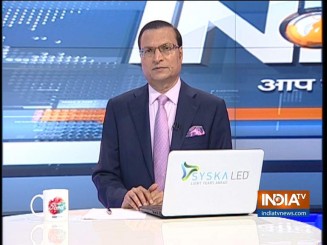 BJP President Amit Shah in a show of strength on Tuesday took out a big road show on the streets of central Kolkata, considered to be the impregnable bastion of Chief Minister Mamata Banerjee’s Trinamool Congress. The large turnout of people at the road show was a clear sign of challenge to the hegemony of Trinamool Congress in West Bengal.
BJP President Amit Shah in a show of strength on Tuesday took out a big road show on the streets of central Kolkata, considered to be the impregnable bastion of Chief Minister Mamata Banerjee’s Trinamool Congress. The large turnout of people at the road show was a clear sign of challenge to the hegemony of Trinamool Congress in West Bengal.
In the morning, Trinamool Congress supporters left no stone unturned to foil the road show. Local policemen along with TMC supporters tore off posters and banners on the streets of Kolkata and openly intimidated Modi supporters.
Despite provocations, the road show began peacefully from Esplanade and Dharmatalla. Large number of Modi supporters joined the road show which was enriched with tableaux depicting the diverse culture of Bengal. The roadshow stretched for several kilometres with BJP workers shouting ‘Jai Sri Ram’, ‘Amit Shah Swagatam’.
Never in the history of West Bengal, BJP had organized such a huge turnout of supporters. Even local BJP leaders had not dreamed that people will join the road show in such large numbers. The streets of Kolkata turned saffron with party president Amit Shah and other top BJP leaders standing on top of a truck with people showering flower petals on them.
An elated Amit Shah told India TV reporter that the huge turnout clearly indicated signs of change in West Bengal. ‘At first we thought we would win 23 seats in Bengal, but seeing the crowd I can surely say we will cross this number’, Shah told our reporter.
Towards the end of the roadshow, desperate TMC supporters threw sticks and bottles at Amit Shah’s truck, and the BJP leaders were immediately taken to safety by para military forces.
Clashes erupted near Calcutta University, where TMC and BJP supporters fought pitched battles. Several motorbikes were set on fire in front of Vidyasagar College. Prime Minister Narendra Modi, on hearing about these clashes, told India TV reporter in Chandigarh that the “people of Bengal will give a befitting reply to Mamata Banerjee for this attack”.
Political pundits including editors of local dailies told our reporter that they never expected such a huge turnout at the roadshow. Tuesday’s show of strength clearly indicates a big undercurrent going on in favour of Modi among Bengal voters. If the popular mood converts into votes, it will be a big headache for Mamata Banerjee in the coming weeks, as the last phase of polling takes place on May 19.
Click Here to Watch Full Video| Get connected on Twitter, Instagram & Facebook
Sam Pitroda’s remark on 1984 anti-Sikh riots may harm Congress in Punjab
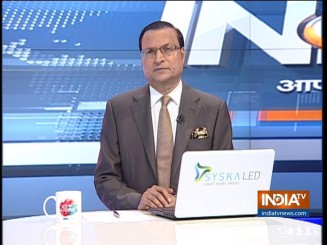 Prime Minister Narendra Modi on Monday continued his attacks on Congress and party chief Rahul Gandhi over the controversial “hua toh hua” ( it happened, so what?) remark made by Rahul’s guru Sam Pitroda relating to 1984 anti-Sikh riots.
Prime Minister Narendra Modi on Monday continued his attacks on Congress and party chief Rahul Gandhi over the controversial “hua toh hua” ( it happened, so what?) remark made by Rahul’s guru Sam Pitroda relating to 1984 anti-Sikh riots.
At a rally in Bathinda, and in rallies in other states too, Modi described Congress as “a party with a confused leader and diffused thinking”. Modi asked whether Rahul Gandhi reprimanded Pitroda for “revealing” what Rahul’s family thought of the 1984 riots.
The Prime Minister said, the “hua toh hua” remark by Pitroda, whom he described as “a mentor who has specially come from America”, “reflects the party’s thinking and arrogance”.
Punjab is going to the polls for 13 Lok Sabha seats on May 19 in the last phase. Since the 1984 anti-Sikh riots is a highly emotive and painful issue among voters of Punjab, Rahul Gandhi has publicly said that he has reprimanded Pitroda and asked him to apologize for the remark.
This “self-goal” by Pitroda has given Modi a handle to beat the party with. In rally after rally, the Prime Minister is linking all other mistakes of the Congress era with this “hua toh hua” remark, to the glee of his listeners.
Politically, this objectionable remark by Pitroda, who has already apologized, is going to cost the Congress heavily in Punjab.
Click Here to Watch Full Video| Get connected on Twitter, Instagram & Facebook
Some Congress leaders have this knack of scoring self-goals during elections
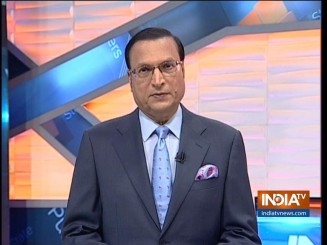 The Congress Party had to face acute embarrassment on Friday, when Prime Minister Narendra Modi took up a seemingly dismissive remark “hua toh hua” made by Rahul Gandhi’s adviser Sam Pitroda over the 1984 anti-Sikh riots. There were strong protests by Sikh organisations in Delhi and Punjab and the party’s effigy was burnt.
The Congress Party had to face acute embarrassment on Friday, when Prime Minister Narendra Modi took up a seemingly dismissive remark “hua toh hua” made by Rahul Gandhi’s adviser Sam Pitroda over the 1984 anti-Sikh riots. There were strong protests by Sikh organisations in Delhi and Punjab and the party’s effigy was burnt.
Prime Minister Narendra Modi while addressing election rallies on Friday sarcastically pulled up the Congress for Pitroda’s “hua toh hua” remark, and said this revealed the mindset of the Congress leaders towards the anti-Sikh pogrom that took place soon after the assassination of the then PM Indira Gandhi by her Sikh bodyguards in 1984.
In the evening, Congress President Rahul Gandhi tweeted: “I think what Sam Pitroda Ji said was completely out of line and he should apologise for it. I think 1984 was a needless tragedy that caused tremendous pain. … The Former PM Manmohan Singh Ji has apologised. My mother Sonia Gandhi Ji has apologised. .. What Mr Sam Pitroda has said is absolutely and completely out of line and is not appreciated. I will be communicating this to him directly. He must apologise for his comment.”
Clearly the party president is rattled, but this is not the first time Sam Pitroda has made comment that is out of line. He had made the remark that the Rs 72,000 to be disbursed annually to poor families under NYAY scheme will be managed by taxing the middle class, which he said was selfish. Rahul Gandhi had to deny this in almost every rally and he had to tell voters that the middle class will not be burdened.
Sam Pitroda had also questioned the outcome of Balakot air strike and he had given Pakistan a clean chit for 26/11 Mumbai terror attacks. By scoring self-goals, Pitroda has allowed BJP to become aggressive again. He has rubbed salt into the wounds of Sikh voters who will be going to the polls in Delhi and Punjab. It is a strange coincidence that during every major election, somebody from the Congress has been scoring self-goals.
The “hua toh hua” remark by Sam Pitroda is not only insensitive towards the 1984 riot victims, but has also angered the Sikh community across India. Naturally, senior Congress leaders are now questioning, “Yeh Kya Hua”.
Pitroda has been active in the Congress since the days of Late Rajiv Gandhi, and nowadays he is considered adviser and “political guru” to party president Rahul Gandhi. He had been claiming that it was he who has been the brain behind the political evolution of Rahul Gandhi as a leader.
For the Congress, it will be difficult for the party to distance itself from Pitroda. Remember Mani Shankar Aiyar, who had taunted Narendra Modi as a ‘chaiwala’ during the 2014 Lok Sabha elections? He had called Modi a “neech” during the Gujarat elections.
It seems during every election, some Congress leader pops up to score a self-goal by shooting off his mouth. The party leadership should be wary, now that the electioneering is entering its last phases.
Click Here to Watch Full Video| Get connected on Twitter, Instagram & Facebook
Why Modi read out list of abuses hurled at him in the last 17 years?
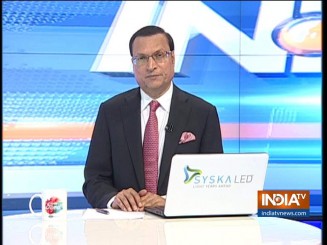 On Wednesday, while addressing an election rally in Haryana, Prime Minister Narendra Modi was in a combative mood. He read out a list of abuses hurled at him during the last 17 years by Congress leaders, starting from Sonia and Rahul Gandhi to leaders at the lower rung.
On Wednesday, while addressing an election rally in Haryana, Prime Minister Narendra Modi was in a combative mood. He read out a list of abuses hurled at him during the last 17 years by Congress leaders, starting from Sonia and Rahul Gandhi to leaders at the lower rung.
A few days ago, Modi had said in Pratapgarh in Uttar Pradesh that “your (Rahul’s) father was praised as ‘Mr Clean’ by his courtiers, but his end came as ‘Bhrashtachari (Corrupt) No. 1″. This remark raised the heckles of Congress leaders, who alleged that the PM has insulted the memory of their departed leader. The Congress even complained to the Election Commission.
It was in this context that Modi read out the list of abuses that had been hurled at him over the years. Sonia Gandhi had described him as ‘maut ka saudagar’ (merchant of death), Mani Shankar Aiyar had described him as “neech” and Rahul Gandhi had been parroting the line ‘Chowkidar Chor Hai’ in almost all his rallies and press conferences.
Rahul Gandhi had also tweeted to Modi after the remark about his father: “The battle is over. Your Karma awaits you. Projecting your inner beliefs about yourself on to my father won’t protect you. All my love and a huge hug.”
A few days ago an interviewer had asked Rahul why he had insulted the then Prime Minister Dr Manmohan Singh by tearing up the ordinance. Rahul replied: “I love him. There is absolute mutual respect between us. I use the words love and respect for him, not just respect.” So, if Rahul can insult his own Prime Minister and say he loves him, then there is nothing to be surprised about if he abuses the present PM as ‘chor’.
There is no doubt that Narendra Modi has himself become the main issue in this general election. If you remove Modi’s name, at least 90 per cent of the speeches of Congress leaders would go waste. Modi, on his part, chooses his topic depending on the time, occasion and venue. Modi was to address two election rallies in Haryana on Wednesday, and raised the issue of Robert Vadra’s controversial land deals.
Modi said: “This chowkidar has taken the person who looted farmers to court. He is making rounds of ED and court to take bail. He used to think he is Shahenshah, now he is nervous. I have already taken him to the jail door. Give blessings and I will put him in jail within the next five years.”
Vadra responded to Modi by saying: “I am shocked to hear my name again in your rally. Please stop digressing from glaring issues by taking my name.” Vadra went on to tweet on Thursday: “Are they above the law to decide and claim who they can send where?”
Congress leaders are feeling the pinch because of Modi’s remarks against Vadra, but they are silent. They have left it to Vadra to defend himself.
Modi did not stop at this. At the Ramlila ground in Delhi on Wednesday, Modi alleged that the late Prime Minister Rajiv Gandhi had taken his wife, in-laws from Italy, other family members and friends like Amitabh Bachchan and Jaya Bachchan to spend an idyllic year-end vacation at Bangaram island near Lakshadweep in 1987. He alleged that Rajiv Gandhi had used the Indian Navy’s largest warship INS Virat “as a taxi” for holidaying.
The 10-day holidaying began on December 30, and I still remember newspapers and magazines splashing stories and articles about Rajiv’s year-end vacation. There were no private news channels those days and it was left to the print media to publish stories about the vacation. Clearly, Modi is raising issues where it hurts the Gandhi family.
Click Here to Watch Full Video| Get connected on Twitter, Instagram & Facebook
Mamata is trying to raise the issue of Bengalis versus outsiders
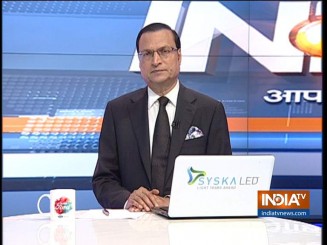 On Tuesday, West Bengal chief minister Mamata Banerjee told an election rally that “I feel like giving Modi a tight slap of democracy”. The constitutional head of government of a state was using such words against the constitutional head of government at the Centre. Really shocking.
On Tuesday, West Bengal chief minister Mamata Banerjee told an election rally that “I feel like giving Modi a tight slap of democracy”. The constitutional head of government of a state was using such words against the constitutional head of government at the Centre. Really shocking.
There is no doubt that Mamata Banerjee is a grassroots political leader who has created her party’s base by dislodging the Left after a protracted struggle. She is indeed a firebrand leader and people appreciate her fighting spirit. But this does not mean that she can insult the Prime Minister for political gains. How can the Chief Minister of a state use such demeaning remark against the Prime Minister of India?
Elections may come and go. Leaders may win or lose power. All this is part of democracy, but to use such words for political gains is unacceptable.
And why is Mamata angry? She is angry because she does not want what she calls ‘outsiders’ coming to Bengal and taking away her chunk of Hindu votes by raising the issue of Muslim appeasement.
By raising the slogan of ‘Jai Shri Ram’ and the issue of restrictions on immersion of Durga Puja idols , BJP has been alleging that Hindus in Bengal are being sidelined and the TMC government is appeasing Muslims. BJP leaders are trying to make a big issue out of Mamata’s mistakes, and, on her part, Mamata has started realizing that mobilizing Muslim votes alone will not help.
She has, therefore, changed her stance and is trying to project BJP leaders as ‘outsiders’ in order to create an issue of Bengalis versus outsiders. It is because of this that in the heat of poll campaign, the West Bengal CM is making intemperate remarks about the Prime Minister.
Click Here to Watch Full Video| Get connected on Twitter, Instagram & Facebook